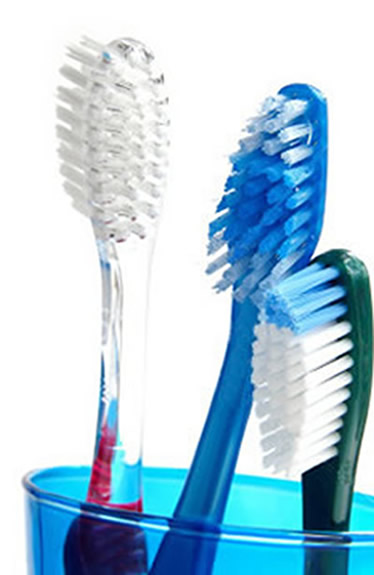Over time, exposing dental enamel to carbonated beverages weakens and permanently destroys enamel. Soda consumed at meal times is less injurious than when consumed alone and continuous sipping is more harmful than the whole drink taken at one time. Non-colas and canned iced tea were especially harmful. They contain flavor additives, such as malic, tartaric and other organic acids which are more aggressive at eroding teeth. Root beer, contains the least amount of flavor additives and was found to the the "safest soft drink to safe-guard dental enamel".
In individuals with diabetes, gum disease is associated with poor control of insulin levels. Pregnant women also need to be careful; gum disease can place pregnant women at risk for having low-birthweight babies. By seeking dental care on a more preventive and pro-active basis you will aid overall health.
You wouldn't think of sharing your toothbrush. Studies show that toothbrushes can become heavily contaminated with oral microorganisms because most families store toothbrushes in a common storage space. Airborne bacteria can move from toothbrush to toothbrush passing opportunistic infections such as periodontal disease and the common cold from one person to another. Your best defense is to go undercover by using a toothbrush cover.
Do You Know A new toothbrush is 30% more effective at removing placque?

Actions taken to control your weight may affect more than your weight, they can put your teeth in danger. Crash diets, eliminating meat or fatty foods, appetite suppressants and extreme behaviors such as fasting and binging and purging harm teeth. According to Academy of General Dentistry, "People need to be aware of how their dieting actions affect their oral health."
Diet pills may decrease salivary flow and cause dry mouth which is devastating to oral health. Fasting can cause a decrease of necessary minerals, including calcium, and anorexia can lead to a deficiency of vitamins and minerals needed to maintain a healthy body and oral health.
Diet is an important part of an individual's medical history, and patients should always inform their dentist and physician if they adhere to a diet plan, dieting behavior or undertake drastic dieting actions.
Position the head of your toothbrush toward your gums as a 45 degree angle and move it back and forth gently in short strokes. Do this for 3 minutes or the length of a song on the radio.
Often oral problems cause no pain and can go undetected and get worse. To save you discomfort and money have a dental exam and tooth polishing every six months.
Gastrointestinal reflux syndrome can cause stomach acid to travel back into the mouth and erode tooth enamel as well as introduce infection causing bacteria into the gum that can lead to periodontal disease or even tooth loss.
If you play sports or are involved in rigorous activities get a mouth guard especially if you have braces, veneers or bridges.
Over 400 drugs can indirectly affect your dental health. Tell your dentist about your prescriptions, you may need a high fluoride rinse or gel to protect your teeth.
Bruxism or grinding your teeth puts pressure of up to 250 pounds per square inch on your teeth. This can cause gums to recede and accelerate periodontal disease. If you wake up with a sore neck or jaw or have frequent headaches talk to your dentist about a splint.
Smokers are four times more likely than nonsmokers to have gum disease. Smoking can also cause oral cancer.
Tearing, cracking or biting objects or chewing on hard things can crack or break your teeth and cause loosen fillings and crowns.
If you don't floss you miss cleaning 30% of each tooth's surface leaving sticky, bacteria laden plaque between your teeth that can cause gum disease and tooth loss. Floss regularly, at least once a day.
Popcorn kernels, frozen candy bars and ice cubes can crack your teeth. Soft drinks contain acid and sugar that will erode tooth enamel and coffee and tea will stain your teeth.